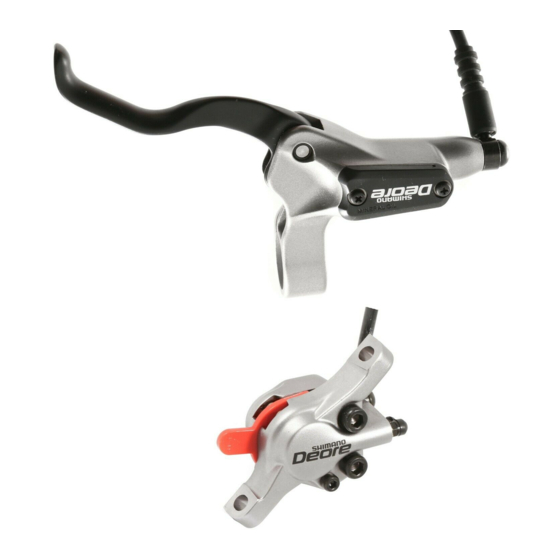Shimano BR-M755 Service-Handbuch - Seite 37
Blättern Sie online oder laden Sie pdf Service-Handbuch für Zubehör für Fahrräder Shimano BR-M755 herunter. Shimano BR-M755 41 Seiten. Disc brake systems

< SM-BH61 >
1.
Pass the hose through the banjo nut and the olive
as shown in the illustration.
Direction of insertion
Hose
2.
In order to check that the end of the hose is fitted
securely into the base of banjo A, make a mark on
the hose beforehand as shown in the illustration.
(As a guide, the length of hose inside banjo A
should be approximately 2.5 mm, measured from
the cut end of the hose.)
Mark
Approx. 2.5 mm
3.
Use an object such as a needle to smooth the inside
of the cut end of the hose, and then install banjo
A. Place the TL-BH61 as shown in the illustration,
and secure it in a vise. Then use a hammer or
similar tool to knock banjo A in firmly until the
base of banjo A touches the end of the hose. If the
end of the hose is not touching the base of banjo
A, the hose may become disconnected or fluid
leaks may occur. Make sure that the banjo faces in
the correct direction at this time.
Banjo A
(brake lever end)
Note : The banjo should
face at an angle
of 90° to the
calipers.of 90° to
the calipers.
Cut end
Olive
Banjo nut
(sold separately)
Banjo A (sold separately)
Vise
TL-BH61
Caliper end
4.
Slide the olive into banjo A until banjo nut can
thread on to banjo A.
5.
While pushing the brake hose,
tighten the banjo nut.
Tightening torque:
5 - 7 N·m {44 - 60 in. lbs.}
6. Installation of the hose
Check that the O-rings are positioned in the
grooves at both the top and bottom of the banjo,
and then secure the banjo to the brake lever and
calipers as shown in the illustration. Make sure that
the O-rings do not protrude from the grooves at
this time. The O-ring has grease applied.
At brake lever end
At caliper end
Tightening torque:
5 - 7 N·m {44 - 60 in. lbs.}
36
Banjo A
Olive
Banjo nut
O-rings
Hose
Banjo
O-rings
